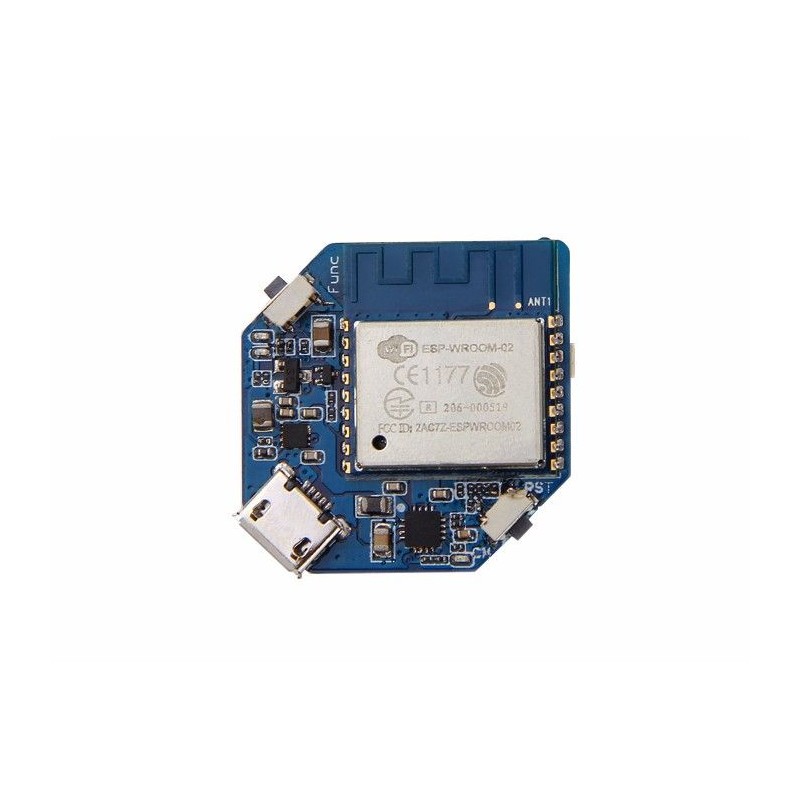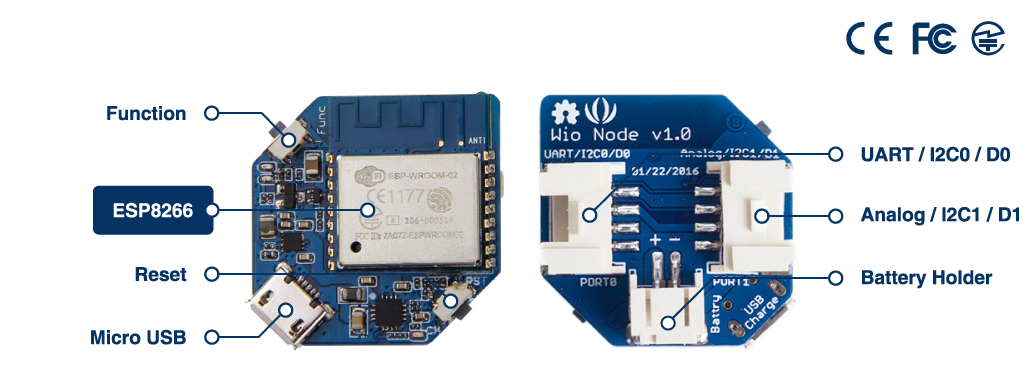





zł41.82 tax excl.
This ESP8266-based development board is designed for rapid IoT application development. It features support for two Grove Plug-n-Play connectors, digital and analog I/O, and UART and I2C interfaces for connecting multiple sensors and modules. The device supports OTA firmware updates, a RESTful API, and integration with mobile apps and IFTTT, allowing for easy remote control and monitoring. Seeed Studio 102110057
Wio Node is a compact and lightweight development board based on ESP8266, designed for rapid IoT application development. Despite its small size, Wio Node offers many features found in larger Wio models, such as support for Grove Plug-n-Play, OTA (Over-The-Air) firmware updates, RESTful API, as well as integration with IFTTT and mobile apps on Android and iOS. The board is intended for easy creation of IoT devices without the need for breadboards, soldering, or connection wires.

Wio Node supports 2 Grove connectors, providing 2 digital input/output pins, 1 analog input, 1 UART interface, and 2 I2C interfaces, allowing connection to up to 42 Grove modules and more in the future. Device configuration is visual and managed via the Wio APP mobile application, which allows sensor readings and actuator control. Due to its lightweight design and low cost, Wio Node is ideal for projects requiring multiple connected devices in IoT systems. Wio Node is an excellent solution for hobbyists, educators, and IoT prototype creators who need an affordable, compact, and easy-to-use platform for internet-connected smart devices.
Manufacturer BTC Korporacja sp. z o. o. Lwowska 5 05-120 Legionowo Poland sprzedaz@kamami.pl 22 767 36 20
Responsible person BTC Korporacja sp. z o. o. Lwowska 5 05-120 Legionowo Poland sprzedaz@kamami.pl 22 767 36 20
4-core cable, 20 cm long, terminated on both sides with a Grove plug. Compatible with the interface used in Seeed Studio and M5Stack modules. Seeed Studio 110990027
4-core cable, 50 cm long, terminated on both sides with a Grove plug. Compatible with the interface used in the M5Stack modules. M5Stack A034-C
A 4-core cable with a length of 50 cm, both terminated with a Grove plug. Seeed Studio 110990038
A 4-core cable with a length of 30 cm, both terminated with a Grove plug. Seeed Studio 110990040
No product available!
4-core cable with a length of 15 cm, terminated on one end with a Grove plug, and on the other with a male goldpin connector. Seeed Studio 110990210
No product available!
Easy to use app builder that allows users to add a variety of buttons, sliders, graphical displays and even RGB controllers to their phone. The SparkFun Blynk Board is specially designed to work with the ‘widgets’ within the Blynk mobile app to create your next IoT project. WRL-13794
ESP8266 based Arduino board for ArduCAM mini camera modules while keeping the same form of factors and pinout as the standard Arduino UNO R3 board. ArduCAM B0082
No product available!
Wifi module with ESPR8266 ESPRESSIF for communication in the 2.4 GHz band. It is powered by a voltage from 3 V to 3.6 V, available in an SMD enclosure. ESP-WROOM-02
Development board with ESP8266 microcontroller with built-in Wi-Fi communication. The system is clocked at 80 MHz and powered by 3.3 V. It includes a Tensillica core and a full Wi-Fi stack. Adafruit 3046
This ESP8266-based development board is designed for rapid IoT application development. It features support for two Grove Plug-n-Play connectors, digital and analog I/O, and UART and I2C interfaces for connecting multiple sensors and modules. The device supports OTA firmware updates, a RESTful API, and integration with mobile apps and IFTTT, allowing for easy remote control and monitoring. Seeed Studio 102110057
Evaluation set designed for the use of Internet of Things based on ArduCAM-Mini-2MP and ArduCAM-ESP8266-Nano-V2 modules. ArduCAM-Mini-2MP is a module with a 2 megapixel camera with an OV2640 transducer and an ESP8266 chip. Mounting the M12 lens. ArduCAM B0085
Plate for applications in the area of Internet of Things (IoT). The module was based on the ESP8266 system, which integrates WiFi, TCP / IP communication, 32-bit MCU, 10-bit ADC and many interfaces such as HSPI, UART, PWM, I2C and I2S. DFrobot DFR0489
WiFi module based on ESP8266. It has an embedded antenna and 0.96 "OLED display. The module can be programmed in Lua (under NodeMCU firmware control) or in the Arduino IDE. Provides 12 GPIO lines.
E-Paper ESP8266 Driver Board is a universal driver board for e-Paper displays. The board is based on the WiFi ESP8266 module. e-Paper ESP8266 Driver Board
LoLin NodeMCU V3 is a board with ESP8266 (ESP12E). The ESP8266 system provides WiFi connectivity (802.11 b / g / n). The USB-UART converter (CH340G chip) is located on the board. The module can be programmed in Lua (under the control of the NodeMCU firmware) or in the Arduino environment. There are 10 GPIO lines available.
Development board D1 Mini with WiFi module ESP-8266MOD and 4 MB Flash memory. The module can be programmed from the Arduino IDE level. WeMos D1 Mini
BMP180 temperature / pressure sensor module compatible with WeMos D1 mini board.
Development board D1 Mini V3 with WiFi module ESP-8266 and 4 MB Flash memory. The module can be programmed from the Arduino IDE level. WeMos D1 Mini V3.x
WiFi module developed by AI-Thinker Co., Ltd with ESP8266 processor. Integrates a 32-bit MCU microcontroller with 80 MHz clock, RTOS support, Wi-Fi and antenna. The module supports the IEEE802.11 b / g / ni standard and has a complete TCP / IP protocol stack. AI-Thinker ESP-12S
Development kit with WiFi / Bluetooth module ESP8266 and 0.96 "OLED display.
Development board D1 Mini Pro with WiFi ESP8266 module and 16 MB Flash memory, equipped with ceramic antenna and external antenna connector. The module can be programmed from the Arduino IDE level. WeMos D1 Mini Pro

This ESP8266-based development board is designed for rapid IoT application development. It features support for two Grove Plug-n-Play connectors, digital and analog I/O, and UART and I2C interfaces for connecting multiple sensors and modules. The device supports OTA firmware updates, a RESTful API, and integration with mobile apps and IFTTT, allowing for easy remote control and monitoring. Seeed Studio 102110057
